Artist
STORMY SIX
![]()
1966-68
Maurizio Masla (vocals)
Franco Fabbri (guitar, vocals)
Luca Piscicelli (guitar, vocals)
Fausto Martinetti (keyboards)
Alberto Santagostino (bass)
Antonio Zanuso (drums)
1968-69
Franco Fabbri (guitar, vocals)
Claudio Rocchi (bass, vocals)
Luca Piscicelli (guitar, bass, vocals)
Antonio Zanuso (drums)
1970-72
Rocchi quits, replaced by
Massimo Villa (bass)
1973-76
Franco Fabbri (guitar, vocals)
Umberto Fiori (guitar, vocals)
Carlo De Martini (sax, violin)
Tommaso Leddi (violin, mandolin, balalajka, guitar)
Luca Piscicelli (bass, vocals)
Antonio Zanuso (drums)
+Giorgio Albani (sound engineer)
1976
Zanuso replaced by
Salvatore Garau (drums)
1978
Umberto Fiori (vocals)
Franco Fabbri (guitar, vibraphone, trombone, vocals)
Carlo De Martini (violin)
Tommaso Leddi (violin, mandolin, guitar, alto sax)
Renato Rivolta (soprano sax)
Pino Martini (bass)
Salvatore Garau (drums)
+ Giorgio Albani (sound engineer)
1979-80
De Martini and Rivolta quit, enter:
Leonardo Schiavone (clarinet)
+ Georgie Born (cello) on recordings (Macchina Maccheronica) and selected
tours
1981
Schiavone replaced by
Stefano Barbaglia (clarinet)
1982
Umberto Fiori (vocals)
Franco Fabbri (guitar, synth guitar, vocals)
Tommaso Leddi (keyboards, guitar)
Pino Martini (bass)
Salvatore Garau (drums)
+ Giorgio Albani (sound engineer)
1993 re-union lineup
Umberto Fiori (vocals)
Franco Fabbri (guitar, synth guitar, vocals)
Carlo De Martini (violin)
Tommaso Leddi (keyboards, violin, balalajka, guitar)
Pino Martini (bass)
Salvatore Garau (drums)
+ Giorgio Albani (sound engineer)
![]()
Not many progressive music collectors are aware that Stormy Six
released some very interesting and original works in that style, the group
having long been associated with the left-wing political and protest songs of their
first albums.
Stormy Six began as a beat band in the 60's in Milan, and they even supported
the Rolling Stones during their first Italian tour.
Their first album, named Le idee di oggi per la musica di domani by their
record company, is a
good example of the genre, with even some light psych influences like in the
instrumental Schalplattengesellschaft mbh, bass player Claudio Rocchi
being the most interested in psychedelia. He was in fact the first to leave the
band to pursue a solo career.
Second album L'unità saw the group reduced to a quartet, with bassist Massimo Villa replacing Rocchi, and keyboardist Martinetti leaving during the recording sessions, though he appeared on some tracks only. The sound was now strongly inspired by the then popular West-Coast style, yet it contained some rock-inspired moments like in the long Suite per F & F with good instrumental parts by Ricky Belloni (then with Il Pacco and later in Nuova Idea) and sax player Claudio Fasoli from Perigeo.
In the third album, Guarda giù dalla pianura, dealing more strongly with protest songs, the Woody Guthrie influence was evident in the cover versions' choice, and the band was now a constant presence in left-wing movements concerts and festivals.
Their 1975 album Un biglietto del tram was the
first proper original Stormy Six album, a highly rated album in Italy at the
time and with strong political contents.
Released on the newly born independent label L'Orchestra
(in which the band members had a leading role), it was a concept album,
based on some events from the last years of World War II in Italy and the
Resistance movement against nazis, the album contained an original blend of folk
and prog sounds and interesting lyrics. Songs like Stalingrado or Dante
Di Nanni (the name of a victim of nazis) have always been in the band's
concerts in later years.
In 1976 a revised line-up produced the instrumental Cliché,
conceived as a soundtrack for a theatre piece and with help from jazz players
Guido Mazzon and Tony Rusconi, and a year later L'apprendista,
one of their best works ever.
A real prog gem, the album had complex rhythm
changes in the best tradition of this style (some comparison are possible with Gentle Giant),
yet retaining a very original mood, with a perfect use of any kind of
instruments and multivocal parts.
At the end of the 70's the band had prolific collaboration with foreign artists and Stormy Six were one of the five founder members (along with Henry Cow from UK, Univers Zero from Belgium, Etron Fou Leloublan from France and Samla Mammas Manna from Sweden) of the RIO-Rock In Opposition international movement, that gave them the opportunity to play all over Europe.
Next album in 1980, Macchina maccheronica, that also becomes the name of the band in some concerts, a varied album in the best RIO tradition with some very good tracks mixed with odd short songs and crazy rhythms, even a waltz! Last chapter in this long story Al volo, in 1982, still a good album that reveals 80's electropop influences added to the typical Stormy Six sound.
In 1984 some of the band members also collaborated with German group Cassiber, releasing some recordings together with the name of Cassix on the English Recommended Records label. Cassix line-up included Umberto Fiori (vocals), Franco Fabbri (guitar), Heiner Goebbels (keyboards) Alfred Harth (sax), Pino Martini (bass), Chris Cutler (drums).
Guitarist Franco Fabbri has written many books on music
and had long collaborations with various avantgarde music and theatre groups, the
others have had many other musical experiences after the band split.
The band
reunited in 1993 for a concert that's been released on the nice Un concerto CD.
In the summer 2013 a new line-up of Stormy Six featuring Umberto Fiori, Tommaso Leddi, Salvatore Garau, Carlo de Martini along with Archimede De Martini (bass, violin) and Francesco Zago (guitars) represented a performance entitled Benvenuti nel ghetto, dedicated to the Warsaw ghetto uprising, with original music and the narrating voice of Moni Ovadia. A CD with DVD taken from this show has been issued at the end of the same year.
![]()
| LP | |||
| Le idee di oggi per la musica di domani | First (FR 50001) Ariston (AR/LP 10035) |
1969 | gatefold textured cover with First logo, some also had a First sticker on the back - black/silver label - probably issued on First and later on Ariston - standard version has 13 tracks, but an 11-track issue exists |
| On Sale Music (64 OMSLP 009) | 2021 | reissue of the above with gatefold cover | |
| L'unità | First (FR 50050) | 1972 | gatefold cover - exists with both black/silver and black/yellow label - released in 1972 though the label carries the date 11/71 |
| Ariston/Oxford (OX 3062) | 1978 | reissue of the above with single cover | |
| Guarda giù dalla pianura | Ariston (AR/LP 12114) | 1974 | gatefold cover - beige Gnomo label - released in 1974 though the label carries the date 11/73 |
| Un biglietto del tram | L'Orchestra (OLP 10001) | 1975 | single cover with lyric inner -custom label |
| BTF/Vinyl Magic (VM 096 LP) | 2012 | reissue of the above - black vinyl, later reissued with red (2020) and yellow (2023) vinyl | |
| Canti della rivoluzione nel mondo | Ariston/Super Oscar (SPO 579) | 1975 | reissue of Guarda giù dalla pianura with different cover |
| Ariston/Oxford (OX 3017) | 1976 | new reissue with another cover | |
| Cliché | L'Orchestra (OLP 10010) | 1976 | single cover with inner - custom label |
| L'apprendista | L'Orchestra (OLP 10012) | 1977 | single cover with inner |
| Macchina maccheronica | L'Orchestra (OLPS 55009) | 1980 | gatefold cover with booklet |
| Al volo | L'Orchestra (MILP 70001) | 1982 | single cover with inner |
CD |
|||
| Le idee di oggi per la musica di domani | Vinyl Magic (VM 042) | 1994 | reissue of 1969 album |
| L'unità | Vinyl Magic (VM 049) | 1995 | reissue of 1971 album |
| Un concerto | Arpa/Sensible (SSB 004) | 1995 | 1993 reunion concert |
| Un biglietto del tram | Fonit Cetra (CDM 2112) | 1996 | reissue of 1975 album - now deleted |
| BTF/Vinyl Magic (VM 096 CD) | 2004 | as above with mini gatefold cover | |
| Gruppo Ed.L’Espresso (16) | 2015 | as above with mini-LP gatefold cover – no.16 in the “Progressive Rock Italiano" series | |
| Al volo | Fonit Cetra (CDM 2113) | 1996 | reissue of 1982 album - now deleted |
| BTF/Vinyl Magic (VM 144 CD) | 2009 | new reissue with mini-LP gatefold cover | |
| L'apprendista | Fonit Cetra (CDM 2125) | 1996 | reissue of 1977 album - now deleted |
| BTF/Vinyl Magic (VM 107 CD) | 2004 | as above with mini gatefold cover | |
| Macchina maccheronica | Fonit Cetra (CDM 2126) | 1996 | reissue of 1980 album - now deleted |
| BTF/Vinyl Magic (VM 106 CD) | 2004 | as above with mini gatefold cover and 2 booklets | |
| Cliché + Pinocchio bazaar | Warner/Fonit (CDM 2132) | 1998 | reissue of 1976 album + extra tracks - now deleted |
| BTF/Vinyl Magic (VM 140 CD) | 2009 | new reissue with mini-LP gatefold cover | |
| Megafono | Diva (DVCD 9801) | 1999 | 2 CD - 1976-82 live recordings |
| Benvenuti nel ghetto | BTF/Vinyl Magic (VM 156CD) | 2013 | CD+DVD - mini-LP cover in rectangular slipcase - credited to "Stormy Six & Moni Ovadia" |
VARIOUS ARTISTS COMPILATIONS |
|||
| Al
Festival Pop Viareggio 1971 (with La manifestazione) |
Ariston (AR/LP 12053) | 1971 | single cover compilation - also includes Nuova Idea and I Top 4 |
| Recommended records sampler (with Reparto novità) |
Recommended (RR 8/9) - UK | 1982 | UK-only 2LP release -
Recommended records sampler - plastic bag with inserts also includes Picchio dal Pozzo. The Stormy Six track, Reparto novità, is the single version. |
| Ricorda con rabbia (with Il mondo è pieno di gente) |
Toast (TDLP 862) | 1989 | clear vinyl compilation - also includes eleven other Italian beat artists |
| Beat pop (with Rossella, Leone, La luna è stanca, Lodi, Il venditore di fumo, Alice nel vento, Nicola fa il maestro di scuola, Sotto il bam-bù) |
Vinyl Magic (VM 058) | 1993 | CD compilation - also includes Equipe 84, Ragazzi del Sole, Corvi |
| Magic bitpop n.7 (with All or nothing, Il mondo è pieno di gente) |
On Sale (52 OSM 019) | 1997 | CD compilation - also includes eight other beat artists |
| Magic bitpop n.16 (with Lui verrà, L'amico e il fico) |
On Sale (52 OSM 041) | 1999 | CD compilation - also includes nine other beat artists |
SINGLES (with picture sleeve) |
|||
| Oggi piango Il mondo è pieno di gente |
Mini (BB 2001) | 1967 | both unreleased tracks |
| Lui verrà L'amico e il fico |
Mini (BB 2006) | 1967 | side A also on Le idee di oggi per la musica di domani in a re-recorded version |
| La luna è stanca Lodi |
First (FR 5007) | 1970 | both unreleased tracks |
| Alice nel vento Il venditore di fumo |
First (FR 5010) | 1970 | both unreleased tracks |
|
Rossella Leone |
First (FR 5053) | 1971 | both unreleased tracks |
| Garibaldi Tre fratelli contadini di Venosa |
First (FR 5056) | 1972 | both tracks from L'unità - probably only issued as a promo with blank cover |
| Sotto il bambù Nicola fa il maestro di scuola |
First (FR 5057) | 1972 | both unreleased tracks |
| 1789 Carmine |
L'Orchestra (ONP 1001) | 1976 | beige label side A from Cliché, side B also on L'apprendista, here in a different instrumental version |
| Cosa danno Reparto novità |
L'Orchestra (OLPN 803) | 1981 | both tracks also on Al volo, but in re-recorded version |
PROMOTIONAL AND JUKEBOX SINGLES (with white label and cover except where noted) |
|||
| Lui verrà | Mini/RT Club (BB 2006/RT 1539) | 1967 | juke box single, backed with Le Anime / L'amore tornerà |
| Alice nel vento | First/Jet (FR 5010) | 1970 | juke box single, backed with Laurent/ Les elephants |
| Sotto il bambù | First/Ariston (FR 5057) | 1972 | juke box single, backed with Ornella Vanoni/ Che barba amore mio |
| PCI promo EP (with La Birindelleide) |
PCI (EP 45) | 1972 | promotional EP with red cover, also includes Anna Identici/Era bello il mio ragazzo and two tracks, Quando s'era diplomato and La ballata della DC credited to Stormy Six but not played by them |
| Cosa danno |
L'Orchestra/Goody Music (JB 66) | 1981 | juke box single, backed with Change / Paradise |
|
CASSIX (Cassiber + Stormy Six) VARIOUS ARTISTS COMPILATIONS |
|||
| The Re Records Quarterly Vol 1 No.3 (with Coste, Religion, The Stanislavsky method, Tempo di pace, Bari, Copy machine, Finta di nulla) |
Recommended Records (Re 0103) - UK | 1986 | also featuring other artists' tracks. Cassix have seven short cuts. |
| The ReR Quarterly Collection, Vol 1 | ReR (QCD1) - UK | 1991 | CD compilation featuring the above tracks |
![]()
All the Stormy Six albums are rather common, except for their first three. The albums by L'Orchestra were commonly also sold by bookshops and in political events during the 70's and have been released in large quantities.
The first album Le
idee di oggi per la musica di domani, is by far their rarest item; it
was chosen to launch the short-lived Ariston
"young" subsidiary First; as it was often the case with Ariston,
it also came out on the head label at the same time or slightly later.
Both issues had the same heavy gatefold sleeve with the First logo, some copies also
carried a First logo sticker on the back cover.
The album had all the tracks connected, and initially had no separation grooves on the
vinyl, according to Franco Fabbri in his Album bianco
book (see Books section for details), it was
re-released with separated tracks to allow an easier airplay.
The standard edition of the record contains 13 tracks, but a different pressing,
with 11 tracks in different order (without Forse and Schalplattengesellschaft mbh)
was released in the same cover as the original (see picture below).
The album had its first vinyl reissue in 2021 on the On Sale Music label.
L'unità was first released with a gatefold cover on the First label, early
copies came with the old black/silver label, soon replaced by the
black/yellow 70's design. The new label also contained the "Produzione
Gnomo" writing like the contemporary alternative releases on Ariston.
A later issue on the Oxford budget price series had the same cover but was not
gatefold.
A track from this album, La manifestazione, was also included in the Al
Festival Pop di Viareggio compilation in an different, longer version
(it was originally a demo), featuring Eugenio Finardi
and Alberto Camerini.
Guarda giù dalla pianura was reissued with the new title Canti della rivoluzione del mondo and new artwork on the budget price Ariston series Super Oscar and Oxford, both still easy to find.
Un biglietto del tram, the first LP on L'Orchestra and probably their bestseller, was reissued many times, following the various changes in distribution that the label had. Originals had the side title in white letters and Ariston distribution credit on back cover.
Macchina maccheronica contained an A5 16-page brown booklet with lyrics
and drawings, and some early copies also contained a promotional tour poster.
It was also
sold in Germany (these were Italian imported copies, some had a distributor's
sticker on the cover) with a second booklet
(black cover - A5 format - 16 pages) with German lyric
translation and different drawings plus a b/w picture of the band.
An east German compilation on Amiga label (no. 8 45 175), entitled Alternative was released in 1980, and was credited to the group Macchina Maccheronica.
Among the Stormy Six rarities, a mention is deserved for a rare promotional EP released by PCI (Partito Comunista Italiano, Italian Communist Party) around 1972 and containing an unreleased track by the group, La Birindelleide, dedicated to Admiral Birindelli, who had become at the time a Member of Parliament in the right wing party MSI. Two other songs on the single were credited to Stormy Six but not played by them, and it also included a popular Anna Identici song. A similar single has been released by Equipe 84 for the PSI (Partito Socialista Italiano, Italian Socialist Party) in 1975.
Around 1973 Stormy Six collaborated with Milan's Student Movement for some singles produced by the movement's own label: the first one was a four-track EP with two songs, Dimitrov and Palestina performed by the group (the other songs are I padroni possono perdere la testa and Come Yu Kung rimosse le montagne, cat.no.MS 003), the second was a single credited to Commissione Artistica del Movimento Studentesco Milanese that contains Compagno Franceschi and E se il nemico attacca (contro ogni opportunismo), cat.no.MS 004. A third single credited to Movimento Studentesco Milano contained two songs written by Umberto Fiori, Chi ha ucciso Saltarelli? and Un bel discorso fine e antifascista and Franco Fabbri may have played on it.
No counterfeits nor other foreign issues exist.
![]()
|
|
|
|
Le idee di oggi per la musica di domani - LP and three different labels, First standard (13 tracks), First alternate version (11 tracks in different order), Ariston. |
|
|
|
|
|
L'unità - LP and label (two different versions) |
|
|
|
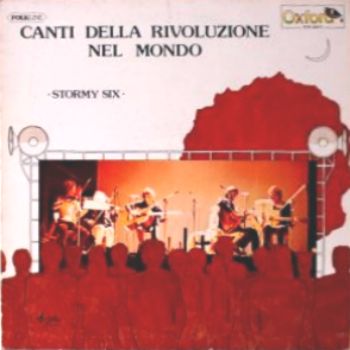 |
|
Guarda giù dalla pianura - LP |
Canto della rivoluzione nel mondo (reissue of Guarda giù dalla pianura) - LP |
|
|
|
|
Un biglietto del tram - LP |
|
|
|
|
|
Cliché - LP |
|
|
|
|
|
L'apprendista - LP |
|
|
|
|
|
Macchina maccheronica - LP |
|
|
|
|
|
Macchina maccheronica - promo poster and booklets |
|
|
|
|
|
Alternative - East German compliation LP front cover |
|
|
|
|
|
Al volo - LP |
|
|
|
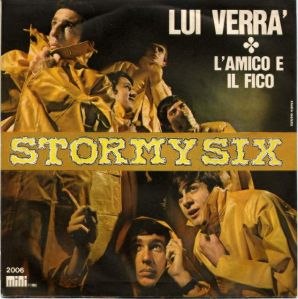 |
|
Oggi piango 7" single |
Lui verrà 7" single |
|
|
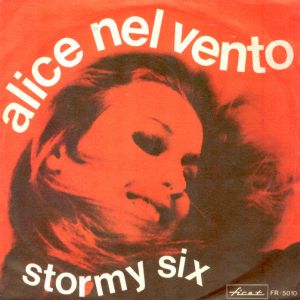 |
|
La luna è stanca 7" single |
Alice nel vento 7" single |
|
|
|
|
Rossella 7" single |
Sotto il bam-bù 7" single |
|
|
|
|
1789 7" single |
Cosa danno 7" single |
|
|
|
|
Un concerto and Megafono live CD's |
|
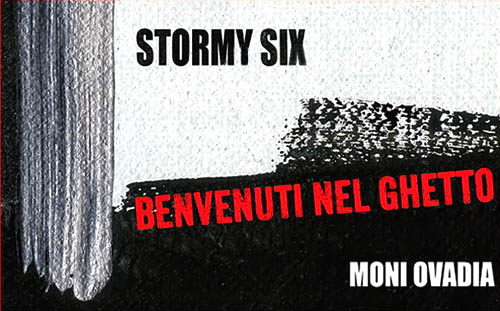 |
|
| Stormy Six & Moni Ovadia / Benvenuti nel ghetto - CD+DVD | |
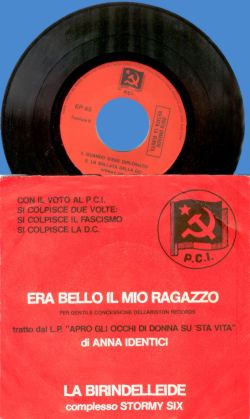 |
|
| PCI promo 7" EP | |
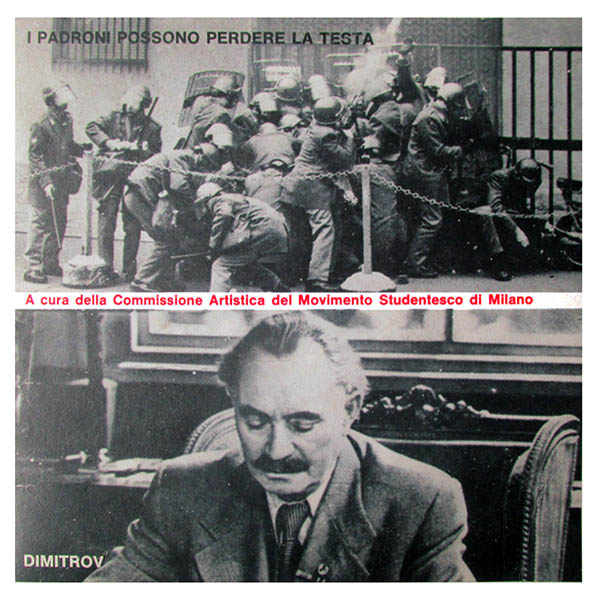 |
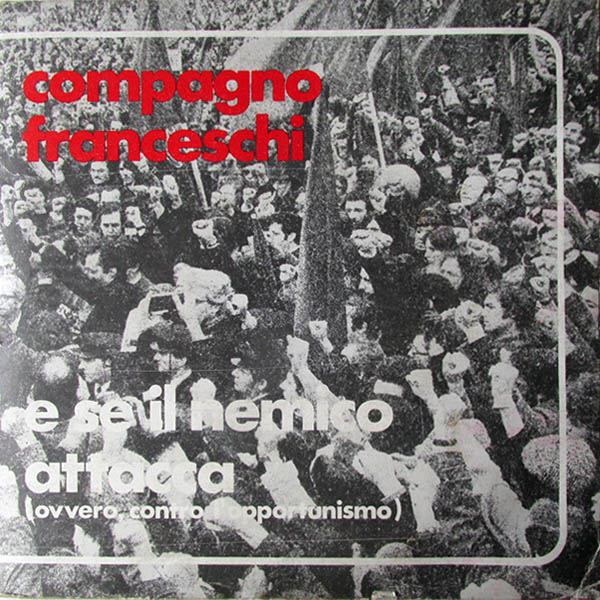 |
| Movimento Studentesco - EP | Movimento Studentesco/Compagno Franceschi - 7" single |
![]()
Guitarist Franco Fabbri
has written a sort of autobiography, Album bianco (see the Books
section for details), that offers a very interesting view on the Italian 60's
and 70's rock scene.
Fabbri also has an Internet website at www.francofabbri.net,
which also contains information on L'Orchestra.
![]()
Many thanks to Franco Fabbri for friendly help and plenty of information.
Also thanks to Alessandro Pomponi from Rockground, Fabiano Petrone, Peppe Carrese and Ubaldo Cibei (Franco), Luciano Fassa, Claudio Bellanti for some information and scans in this page.